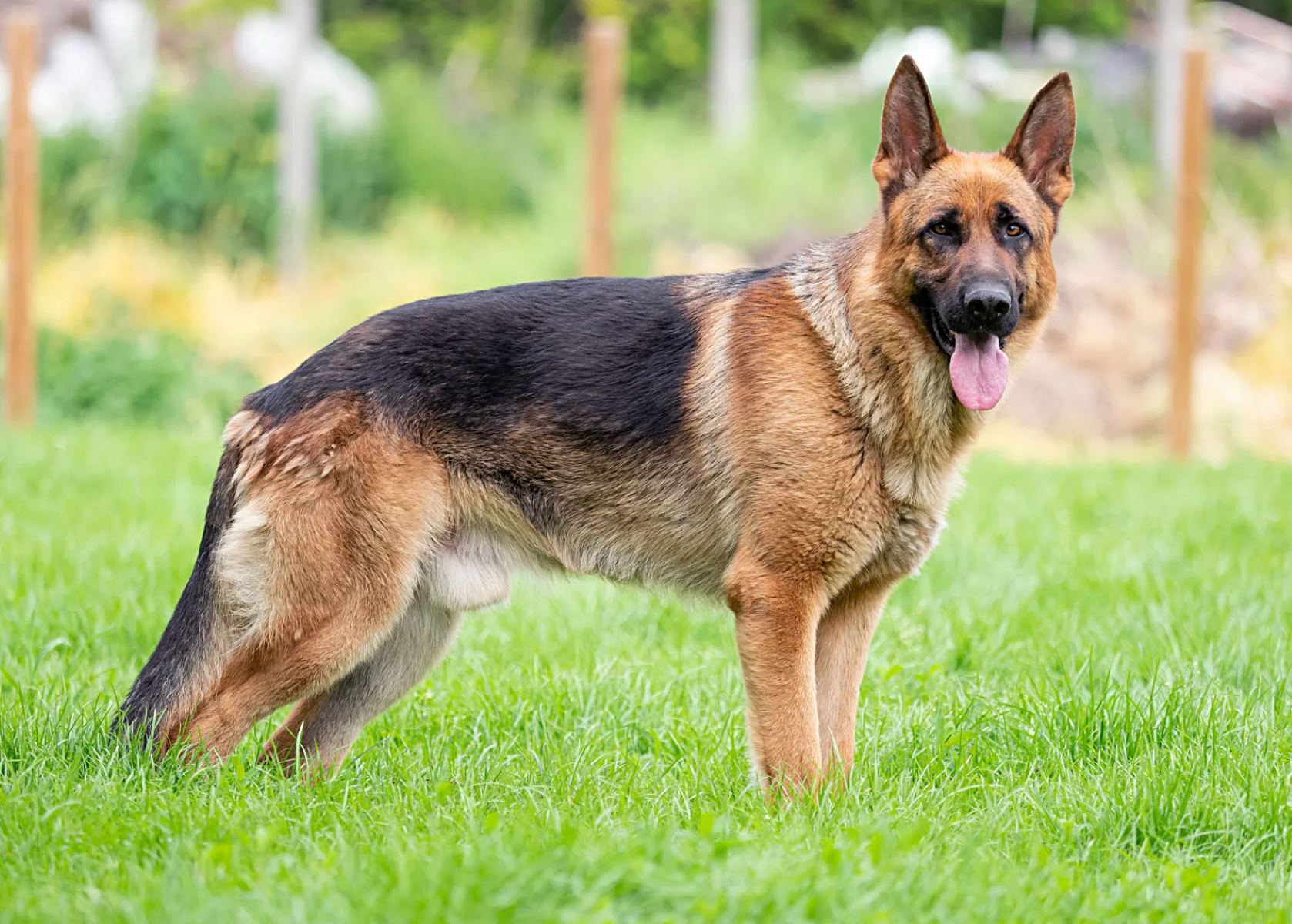Home>Pets & Animals>The Shocking Truth About Doberman Dogs: Are They Really As Aggressive As They Say?


Pets & Animals
The Shocking Truth About Doberman Dogs: Are They Really As Aggressive As They Say?
Modified: April 1, 2024
Discover the truth about Doberman dogs' aggression and temperament. Learn about their behavior and find out if they make great pets. Explore the myths and facts about Dobermans.
(Many of the links in this article redirect to a specific reviewed product. Your purchase of these products through affiliate links helps to generate commission for Regretless.com, at no extra cost. Learn more)
Table of Contents
Introduction
Doberman dogs have long been shrouded in misconceptions and stereotypes, often portrayed as aggressive and intimidating creatures. However, the truth about these remarkable canines may surprise many. While their striking appearance and unwavering loyalty often evoke fear in the minds of some, a deeper understanding of their nature reveals a different story altogether. In this comprehensive exploration, we will delve into the history of Doberman dogs, debunk common misconceptions, and uncover the truth about their alleged aggression. Furthermore, we will examine the various factors that influence their behavior and provide valuable tips for training and socializing these remarkable companions. Join us on this enlightening journey as we unravel the shocking truth about Doberman dogs and challenge the prevailing myths that have overshadowed their true essence.
History of Doberman Dogs
The history of Doberman dogs is a fascinating tale that traces back to the late 19th century in Germany. This noble breed was developed by a visionary tax collector named Karl Friedrich Louis Dobermann, who sought a loyal and protective companion to accompany him during his perilous tax collection rounds. Drawing inspiration from various dog breeds, including the Rottweiler, German Pinscher, Greyhound, and Weimaraner, Dobermann meticulously crafted a versatile and formidable canine companion.
The Doberman breed was further refined by breeders after Dobermann's death, resulting in the sleek, muscular, and agile dogs we recognize today. Their exceptional intelligence, unwavering loyalty, and remarkable versatility soon caught the attention of military and police forces, where they were employed as working dogs due to their exceptional guarding and protection instincts.
During the World Wars, Doberman dogs served with distinction, earning a reputation for their bravery, loyalty, and unwavering dedication to their handlers. Their remarkable abilities were further showcased in various roles, including search and rescue, therapy work, and as beloved family pets.
Over the years, the Doberman breed has evolved into a beloved companion, revered for its protective nature, intelligence, and loyalty. While their imposing stature and keen instincts continue to make them popular choices for security and protection, their gentle and affectionate demeanor with their human families has endeared them to countless households around the world.
The rich history of Doberman dogs not only reflects their remarkable journey from humble origins to global prominence but also underscores their enduring legacy as one of the most versatile and beloved canine companions. Understanding the historical context of the Doberman breed provides valuable insights into their innate characteristics, dispelling misconceptions and shedding light on their true nature as remarkable and multifaceted companions.
Common Misconceptions About Doberman Dogs
Misconceptions about Doberman dogs have persisted for decades, perpetuating a skewed perception of these remarkable canines. Despite their unwavering loyalty and affectionate nature, they have often been unfairly labeled as inherently aggressive and dangerous. These misconceptions stem from a combination of factors, including sensationalized media portrayals, lack of understanding about the breed's true characteristics, and isolated incidents that have unfairly generalized the entire breed.
One of the most prevalent misconceptions is the belief that all Doberman dogs are inherently aggressive. This misconception is rooted in the breed's history as guard dogs and working companions. While they possess a natural instinct to protect their families, their aggression is typically a response to perceived threats or when they sense their loved ones are in danger. In reality, well-bred and properly socialized Dobermans exhibit a balanced and stable temperament, making them affectionate and loyal companions.
Another common misconception is that Doberman dogs are dangerous around children. This belief often arises from misconceptions about their protective nature. In truth, when raised and socialized properly, Dobermans can be gentle and patient with children, forming strong bonds and displaying remarkable patience and affection. Their natural protective instincts can actually make them excellent guardians for children, provided they are trained and socialized from an early age.
Additionally, the notion that Dobermans are inherently difficult to train has perpetuated a negative stereotype. While they are indeed intelligent and independent, these qualities can be channeled through consistent and positive training methods. With the right approach, Dobermans can excel in obedience training, agility, and various canine sports, showcasing their remarkable intelligence and willingness to please their owners.
Furthermore, the misconception that all Doberman dogs are aggressive towards other animals has unfairly painted them as incompatible with other pets. In reality, early socialization and proper introductions can foster harmonious relationships between Dobermans and other animals, including cats and smaller pets. Their adaptable nature and keen intelligence enable them to coexist peacefully with other animals when introduced in a controlled and positive manner.
By dispelling these misconceptions and gaining a deeper understanding of the true nature of Doberman dogs, we can appreciate them for the remarkable companions they are. Through education, responsible ownership, and positive exposure, we can challenge these misconceptions and celebrate the unique qualities that define the Doberman breed.
The Truth About Doberman Dogs' Aggression
Contrary to popular belief, the aggression attributed to Doberman dogs is often misunderstood and misrepresented. While their imposing stature and unwavering loyalty may evoke a sense of intimidation, it is essential to unravel the truth behind their perceived aggression. The reality is that Dobermans are not inherently aggressive by nature. Instead, their behavior is shaped by a myriad of factors, including genetics, upbringing, training, and socialization.
Genetics play a pivotal role in determining a Doberman's temperament. Responsible breeders prioritize breeding for stable and balanced temperaments, ensuring that aggression is not a dominant trait within the breed. Through selective breeding and careful genetic considerations, reputable breeders strive to produce Dobermans with sound temperaments, emphasizing traits such as intelligence, loyalty, and adaptability.
Furthermore, the upbringing and environment in which a Doberman is raised significantly influence their behavior. Early socialization, positive exposure to various stimuli, and nurturing environments play a crucial role in shaping their temperament. When raised in a loving and supportive environment, Dobermans exhibit affectionate and gentle behavior, forming strong bonds with their human families and demonstrating remarkable patience and loyalty.
Training also plays a pivotal role in mitigating any potential aggressive tendencies. Positive reinforcement training methods, coupled with consistency and patience, can channel a Doberman's intelligence and energy in constructive ways. By establishing clear boundaries and fostering a harmonious relationship based on mutual respect, owners can cultivate a well-mannered and obedient Doberman companion.
It is important to recognize that any breed, including Dobermans, can exhibit behavioral issues if subjected to neglect, abuse, or inadequate training. Understanding the individual needs and traits of the Doberman breed is essential for fostering a nurturing and supportive environment that encourages positive behavior and emotional well-being.
By dispelling the myth of inherent aggression and acknowledging the multifaceted factors that influence a Doberman's behavior, we can appreciate these remarkable companions for their true nature. With responsible ownership, proper training, and a nurturing environment, Doberman dogs can exemplify unwavering loyalty, affection, and remarkable companionship, challenging the misconceptions that have overshadowed their true essence.
Factors That Influence Doberman Dogs' Behavior
The behavior of Doberman dogs is influenced by a myriad of factors, encompassing genetics, upbringing, environment, and training. Understanding these influential elements is crucial for comprehending the intricacies of their temperament and behavior.
Genetics play a pivotal role in shaping a Doberman's disposition. Responsible breeding practices prioritize traits such as intelligence, loyalty, and stability, while actively mitigating aggressive tendencies. By selectively breeding dogs with sound temperaments, reputable breeders strive to perpetuate the breed's innate qualities of loyalty and affection, ensuring that aggression does not overshadow their true nature.
The upbringing and environment in which a Doberman is raised significantly impact their behavior. Early socialization, positive exposure to various stimuli, and nurturing surroundings are instrumental in shaping their temperament. When introduced to diverse experiences and interactions from a young age, Dobermans develop confidence, adaptability, and a well-rounded disposition. Additionally, a loving and supportive environment fosters a sense of security and trust, nurturing their innate loyalty and affection.
Training is an essential factor in molding a Doberman's behavior. Positive reinforcement techniques, consistency, and patience are fundamental in harnessing their intelligence and energy. Through clear communication and structured training, owners can establish boundaries and expectations, fostering a harmonious relationship based on mutual respect. Proper training not only cultivates obedience but also reinforces the bond between the Doberman and their human family, promoting a sense of security and understanding.
Furthermore, the physical and emotional well-being of Doberman dogs significantly influences their behavior. Regular exercise, mental stimulation, and a balanced diet are essential for maintaining their overall health and contentment. Adequate physical activity not only expends their energy but also provides an outlet for their natural instincts, promoting a balanced and well-adjusted demeanor.
By recognizing and addressing these influential factors, owners can cultivate a nurturing and supportive environment that encourages positive behavior and emotional well-being in Doberman dogs. Through a holistic approach encompassing genetics, upbringing, environment, and training, the remarkable qualities of loyalty, affection, and unwavering companionship inherent in Dobermans can shine through, dispelling misconceptions and celebrating their true nature.
Tips for Training and Socializing Doberman Dogs
Training and socializing Doberman dogs are pivotal aspects of fostering a well-mannered, balanced, and affectionate companion. By employing effective training techniques and nurturing positive social interactions, owners can cultivate a harmonious relationship with their Doberman while promoting their emotional well-being and adaptability.
Consistent and Positive Reinforcement
Consistency is key when training Doberman dogs. Establishing clear boundaries and expectations through positive reinforcement techniques reinforces desirable behavior. Reward-based training, such as using treats, praise, and play, serves as powerful motivators, encouraging obedience and reinforcing the bond between the owner and their Doberman.
Early Socialization
Early socialization is imperative for Doberman dogs to acclimate to various environments, individuals, and animals. Introducing them to diverse experiences, including different sounds, sights, and interactions, fosters adaptability and confidence. Positive exposure to other dogs, people, and environments during their formative months lays the foundation for well-adjusted and sociable behavior.
Obedience Training
Obedience training is essential for instilling discipline and fostering a strong bond between the owner and their Doberman. Teaching basic commands, such as sit, stay, come, and heel, establishes clear communication and reinforces the owner's role as a leader. Consistent practice and positive reinforcement ensure that Dobermans respond reliably to commands, promoting a well-behaved and obedient demeanor.
Read more: Unveiling The Truth: The Real Deal About Linear Algebra – Is It Really As Hard As They Say?
Physical and Mental Stimulation
Doberman dogs are highly intelligent and energetic, requiring both physical and mental stimulation. Engaging in regular exercise, interactive play, and stimulating activities not only expends their energy but also channels their intelligence in constructive ways. Interactive toys, puzzle games, and agility exercises provide mental enrichment, preventing boredom and promoting a balanced and contented disposition.
Patience and Understanding
Patience is paramount when training and socializing Doberman dogs. Understanding their individual temperament, needs, and learning pace is essential for fostering a trusting and respectful relationship. Consistent guidance, positive reinforcement, and a patient approach lay the groundwork for a well-adjusted, confident, and affectionate Doberman companion.
By incorporating these tips into the training and socialization of Doberman dogs, owners can nurture their remarkable qualities of loyalty, affection, and intelligence while dispelling misconceptions surrounding the breed. With patience, consistency, and a nurturing approach, Doberman dogs can thrive as well-mannered, sociable, and devoted companions, embodying the true essence of their remarkable breed.
Conclusion
In conclusion, the journey through the world of Doberman dogs has been a revelatory exploration, dispelling misconceptions and shedding light on the remarkable truth behind this noble breed. From their rich history as versatile working companions to their enduring legacy as loyal and affectionate family pets, Dobermans embody a multifaceted nature that defies the stereotypes that have overshadowed their true essence.
Through a deeper understanding of the factors that influence their behavior, it becomes evident that Doberman dogs are not inherently aggressive but rather shaped by genetics, upbringing, environment, and training. Responsible breeding practices, early socialization, positive reinforcement training, and nurturing environments play pivotal roles in cultivating their unwavering loyalty, affection, and balanced temperament.
The misconceptions that have plagued Doberman dogs, including their alleged aggression, incompatibility with children and other animals, and difficulty in training, have been effectively debunked. By challenging these misconceptions and embracing a holistic approach to their well-being, Dobermans can thrive as exemplary companions, embodying qualities of intelligence, loyalty, and adaptability.
Furthermore, the tips for training and socializing Doberman dogs provide valuable insights for owners, empowering them to cultivate harmonious relationships with their beloved companions. Consistent and positive reinforcement, early socialization, obedience training, and providing physical and mental stimulation are instrumental in fostering well-mannered, sociable, and devoted Dobermans.
In essence, the shocking truth about Doberman dogs transcends the misconceptions that have clouded their reputation. They stand as testaments to resilience, loyalty, and unwavering devotion, challenging preconceived notions and capturing the hearts of those who truly understand their remarkable nature. By embracing responsible ownership, positive training methods, and a nurturing environment, Doberman dogs can flourish as cherished members of the family, embodying the true essence of their noble breed.













